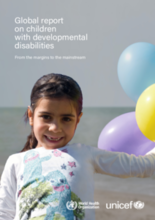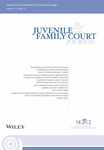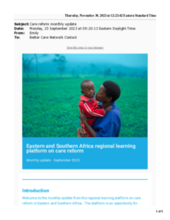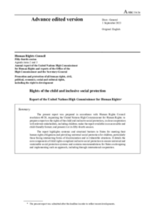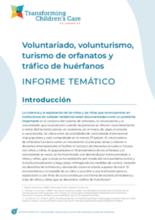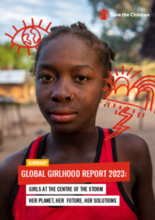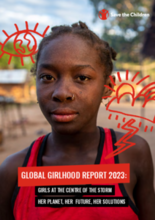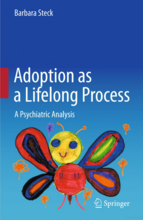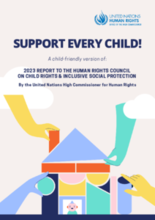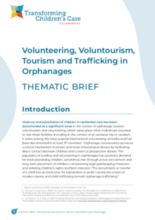Displaying 121 - 130 of 1343
This WHO-UNICEF Global Report on children with developmental disabilities provides principles and approaches to intentionally include the needs and aspirations of children and young people with developmental disabilities in policy, programming and public health monitoring.
The purpose of this nonexperimental quantitative study was to examine the responses of 18- to 24-year-olds (n = 83) who had been in out-of-home care, comparing early adolescent versus non-early adolescent placement, placement setting, and sibling accessibility on attachment.
This is the monthly update of the Eastern and Southern Africa Regional Learning Platform published in September 2023.
The present report was prepared in accordance with Human Rights Council resolution 49/20, requesting the United Nations High Commissioner for Human Rights: to prepare a report on the rights of the child and inclusive social protection, in close co
Este Informe Temático sobre voluntariado, volunturismo, turismo de orfanatos y tráfico de huérfanos fue elaborado para aportar lineamientos a los Gobiernos, los responsables de políticas y otros responsables de la toma de decisiones. También respalda la implementación de los compromisos internacionales asumidos en el contexto de la Resolución de la Asamblea General de la ONU 2019 sobre los Derechos de los niños y las niñas privados del cuidado parental. Explica de qué modo tomar las medidas apropiadas para abordar y prevenir los daños asociados al voluntariado en orfanatos, el turismo de orfanatos y el volunturismo, y al tráfico de huérfanos vinculado con las actividades anteriores.
The climate crisis is already changing girls’ lives and futures. Save the Children’s analysis shows that between now and 2030, almost 60% of girls - that’s 931 million - will experience at least one extreme weather event, like flooding, drought or heatwaves.
This year’s adolescent-friendly Global Girlhood Report explores how the climate crisis impacts girls’ rights. It features new analysis by Save the Children on emergency hotspots where girls face the dual threat of child marriage and climate disasters, and stories of girls advocating for climate action in their communities.
This book addresses the psychosocial complexities of adoption from multiple perspectives, including the biological family, adopted child, and adoptive parents. It highlights the must-have sensitivity and tactfulness for recurring discussions of the adoption situation.
The OHCHR submitted the first-ever child-friendly report, conducted with over 600+ child participants worldwide. The premise of this report is based on children's right to social support. Most children cannot access social aid and protection and, therefore, cannot access their other rights.
This thematic brief contains guidance on key policy measures and concrete steps that may assist with the development and implementation of a whole-of-government strategy to eliminate orphanage tourism and voluntourism and to combat orphanage trafficking. It includes recommendations relevant to volunteer-sending and volunteer-receiving countries. In addition, it contains practical examples of effective measures from a diverse range of countries sending and receiving volunteers.

